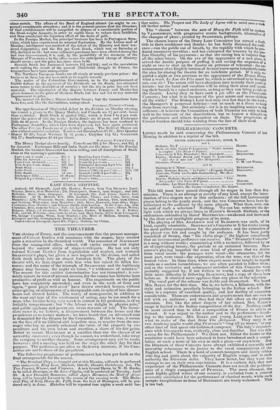PHILHARMONIC CONCERTS, LITTLE needs be said concerning the Philharmonic Concert
of has Monday in addition to a reprint of the bill.
THIRD CONCERT—MONDAY, APRIL 8.
ACT I.
Sinfouii, No.7 meet. ea Aria, Signor F. LAULACII Vedr6 mentre io st.spiro•' (Le .510::ze di Figaro) Colwell() in E flat, Piattorerte, Mrs. ANDERSON P kl'110, MAallIe BALER and Signor F. LAHLACKE, ' • Alrl cite it mio cur" (Der Ate/ill:Aid) Overture, Oberon
ACT II.
Siafouia is C Minor Aria, thud itii BAi.es, " lo Podia" (Torquato Tessa) Concerto, Violin (ncllo stilo drammatico.), Mr. MA- ouovs Mello, Madame BALFE and Signor LAB/ACHE, " Cru- del penile" (Le Nozze di Pliant) MozAar. Overture, Les Dear Journees.. e Leader, Mr. COOKE.--.COIAUCtIJI, Mr. BISLIorC.IIERUMNI.
This bill must have passed through all its stages in less than five minutes. There is no attempt ut novelty of any kind, except the intro- duction of two singers new to this orchestra : all the full instrumental pieces belong to the yearly stock, and the two Concertos have been fa- miliarized to the audience by the same players. What then, now, can be said of such a selection ? Nothing. We can but reiterate the de- light with which we always listen to Harm's Seventh Sinfonia, or the enthusiasm enkindled by thatof BEETHOVEN—awakened and increased by the clear and intelligible progress of its story.
The playing of Mrs. ANDERSON and of BLAGROVE was each, of its kind, equally admirable. BEETHOVEN'S Concerto in E flat ranks among his most perfect compositions for the pianoforte ; and the animation of the player was hilt and caught by the audience. It has been justly remarked of SPOIth, that " his violin sings ;" the highest compliment that an instrumental performer can receive. Ills " Dramatic Concerto" is a song without words ; commencing with a recitative, followed by an air of captivating beauty, the prelude to an animated bravura. BLA. GROVE'S playing imparted the same kind of pleasure that we derive from vocal music : the passages were vocal—the ornaments, for the most part, were vocal—the expression, often the tone, was that of the human voice. In these days, when singers seem to be taught to regard words as a useless incumbrance, we are often puzzled to ibllow them; and as the recitative and subsequent melodies of this Concerto were probably suggested by, if not written to words, we should have felt little more difficulty in following Baacuova, had a copy of them been before us. It obtained more applause than any piece in the selection. The vocal part of the scheme was feeble and ill-assorted. We heard Mrs. Ream for the first time. She is, we believe, a Milanese, with the style and animation peculiarly belonging to the Italian school. Her voice is a soprano of excellent quality, and her facility of execution considerable. These are endowments and acquirements that are sure to tell with an audience ; and they had their full ell'ect on the present occasion. But, like the other singers of her school, Mrs. llaare's range is limited to the Italian compositions of the day. Nothing could be more absurd than to allot a composition of Seoul; to artists so trained. It was unjust to the author and to the performers—insult- ing to the audience. Mrs. BALKE and young LADLACHE knew not what to make of the duct fronf The Ala/outlet. They sung it as two Academy pupils would sing Puttee:La's " Sing all ye muses," or any other duet of that queer old-litshioned composer. The lady's acquaint- ance with DoNizarri was, evidently, close and familiar. But was this a song for the Philharmonic ? We think not. Either the leader or the conductor world have been ashamed to have introduced such a compi- lation or such a score of his own in such a place—or anywhere. But the Directors of these Concerts Lave always exhibited a cowardly and unworthy reluctance to do justice to the vocal compositions of the English school. There is a herd of concert-loungers and dandy critics who lisp and prate about the vulgarity of English songs, and to such authority the Directors defer. They know better, but they want the courage to act on their own convictions. It is a curious fact, that our experience of the Philharmonic Concerts does not recall the perform- ance of a single composition of PURCELL. The most classical, the most highly-gifted writer of our country, is excluded from a concert avowedly established for the performance of classical music, while such
as those of DONIZETTI are freely -welcomed. This is too bad.
HAYDN.
MOZART. BKEVIUYEN.
Sromt.
C. M. vox Wznza.
Men:twee.
DONIS EY/I.
srona.


























 Previous page
Previous page